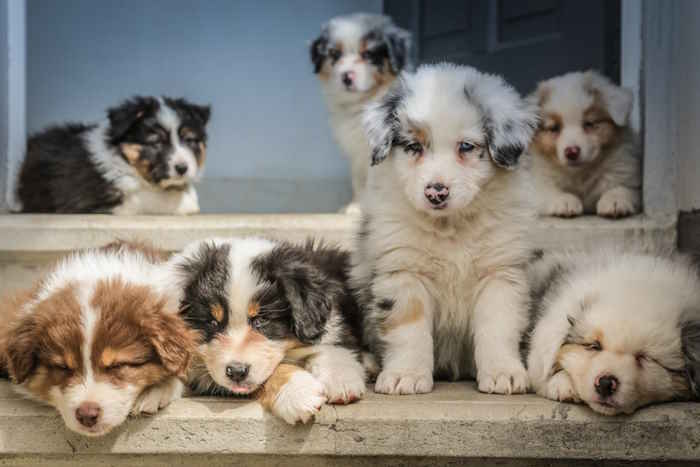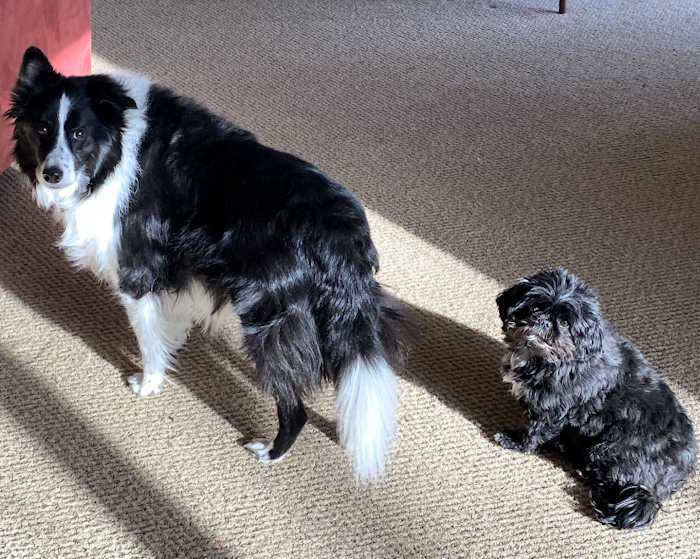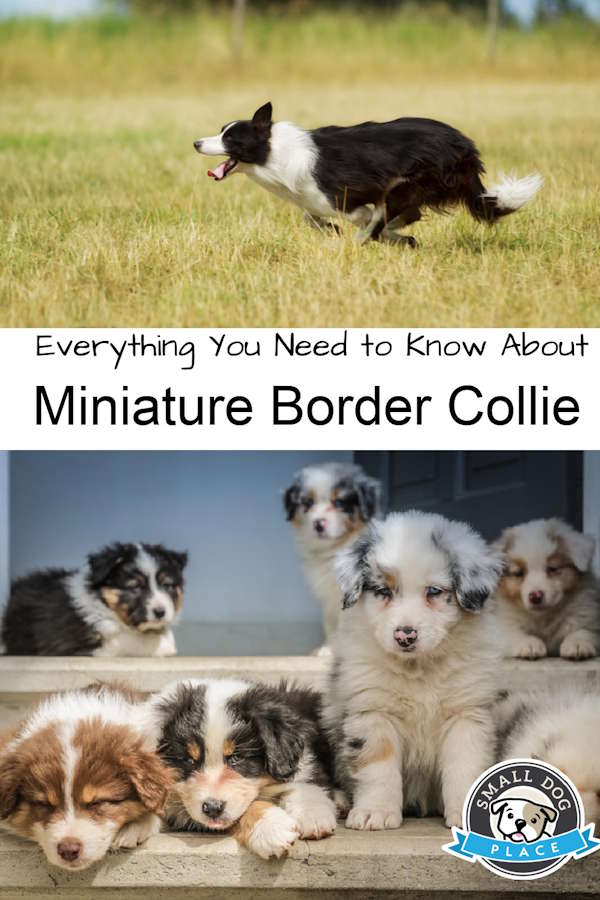- Small Dog Place Home
- A-Z Breeds A to M
- Miniature Border Collie
The Miniature Border Collie
Miniature Border Collie
Mini border collies are a beautiful breed that not that many people have had the pleasure of witnessing! Essentially they’re a smaller version of the popular border collie, and so ideal for people who have small apartments or who just adore small, lovable dogs.
Curious to find out more about the mini version of one of the most intelligent dog breeds? Here are seven facts about the mini Border Collie.

1. Bundles of Energy
Mini Border Collies are delightful dogs that love to have fun and are very playful. They tend to be upbeat and positive most of the time, so it is rare you will see them looking lethargic and sullen.
Mini border collies are energetic dogs who love to chase down smaller animals and follow you around wherever you go. (That’s the herding breed instinct coming out!) If you want a companion who will be by your side every step of the way, then a miniature border collie is a great choice.
However, if you want a dog who doesn’t require much energy or attention, this breed isn’t for you. Mini Border Collies are so energetic that if you don’t give them something to do and you leave them cooped up for most of the day, they will become destructive and act out.
In other words, make sure they stay occupied and have a playmate or plenty of space to run around and wear themselves out.
2. A Lengthy Lifespan
How long can you expect a miniature border collie to live? They tend to live as long as their regular-sized counterparts, which is typically 12-15 years. Of course, if your dog has health problems, that can greatly limit its lifespan, and genetics play a part as well in how long they live too.
If you want to ensure that your miniature border collie lives a long and healthy life, take your dog to the vet regularly for checkups and ensure that you feed your mini bundle of love a healthy diet and give her or her plenty of exercise.
Talk to your vet about what foods would be best for your miniature border collie to eat.
3. Extremely Intelligent
One of the standout features of a border collie is how intelligent they are. Collies tend to be very trainable dogs, so if you want them to help you control your farm animals or you want to teach yours some tricks, then it shouldn’t take a lot of work to do so.
They take to training well, and they can learn fast, so they are good for people who don’t have a lot of time on their hands to thoroughly train their dog or who don’t want to spend a lot of time in obedience training.
Some dogs need to be told what they can and cannot do repeatedly, but not miniature border collies. They pick up on commands quickly and figure out their role without any hesitation.
4. They Can Get Pretty Big for a Miniature...
 This is Captain, the Mini Border Collie, and Millie, a small Shih Tzu.
This is Captain, the Mini Border Collie, and Millie, a small Shih Tzu.Even though these are miniature dogs, this breed of border collie can reach sizes of anywhere from between 30-40 pounds. The height can vary, but they usually stand about 16-22 inches tall at the shoulder.
That may not seem like a small dog to you, but it is considerably smaller than a full-size border collie.
Please remember that individual dogs may vary and these are average sizes. The photo above was submitted from a Small Dog Place visitor. As you can see, there is a size differential between a standard size Shih Tzu (9 to 16 pounds) and a Miniature Border Collie.
5. Cheaper to Own
This may not come as a surprise, but a miniature border collie eats less food, requires less exercise and takes up less space than a border collie.
You can buy a smaller bed and pet carrier, plus your dog will not be able to cause as much destruction as a full-size border collie! In other words, the mini versions are less expensive to keep and ideal for those who want less doggy drama!
6. Okay, so they’re not technically a ‘breed’ of their own
Did you know that the miniature border collie is not a true breed? It is really just a smaller version of the full-size border collie, and any small border collie is called a miniature. It’s possible that your miniature border collie, when it gives birth, will give birth to full-size puppies.
Miniature border collies are made by breeding a regular border collie with a smaller dog, in most cases. This helps to increase the chance that the resulting puppies will be of the miniature variety.
7. Genetic health problems
There are a few genetic and common health issues that miniature border collies can, unfortunately, suffer from. This doesn’t mean that yours is likely to have one of these conditions, of course, but it’s good to be equipped with the knowledge.
Common minor health problems in these lovable minis include seizures, hypothyroidism, retinal atrophy, and canine hip dysplasia.
If you would like to find out if your dog is predisposed to one of these conditions or has it already, then you can take the dog to a veterinarian for testing. This can help you prepare for the future, or give you peace of mind.
Of course, with regular vet checks, your vet will be able to keep a close eye on your mini and keep them in good health.
How Do Breeds Become Miniaturized?
Any dog breed can undergo a transformation from large to miniature and it's not that difficult to achieve. All you need is a breeder or breeders willing to reduce the size of the breed to small proportions.
Often breeders will do this as a request for a smaller versions of a specific breed, or they may do it unintentionally. There is always the chance that a litter of puppies will have a runt that is smaller than all the other puppies.
Take that runt and breed it to another runt from another litter and you are creating a smaller version of the same breed. Is it advised?
People have been manipulating breeds since the 19th century when many of today's dog breeds came into existence. There was always a reason why a new breed was needed, usually for a work related purpose such as hunting.
In the 21st century, breeders are still experimenting with genes to create different dogs and the creation of smaller dogs seems to be extremely popular.
It's not that we don't already have enough small dogs, but rather people may fall in love with an extremely popular breed but do not have the room for the full size version and prefer a smaller, scaled down down dog with the same personality and abilities, but miniaturized in size. Is this ethical?
Wherever you stand on the ethical continuum, remember, that this is not a new phenomenon. Many of today's' small dogs were once members of a much larger breed.
Just as a quick example, today's typical 4 pound Yorkshire Terrier was once related to a breed that began as a larger breed with a popular sire, Huddersfield Ben, who was 11 pounds and a tough ratter in his day.
Commonly Asked Questions about the Mini Border Collie
Are Miniature Border Collies good with children and other pets?
Are Miniature Border Collies good with children and other pets?
Yes, they are usually good with children and other pets, especially when they're properly socialized from a young age. However, due to their strong herding instinct, they may try to herd small children and other pets.
Do Miniature Border Collies shed a lot?
Do Miniature Border Collies shed a lot?
Yes, like their larger counterparts, Miniature Border Collies do shed. Regular brushing can help manage loose hairs and keep their coat healthy.
Are Miniature Border Collies hypoallergenic?
No, they are not considered hypoallergenic. If allergies are a concern, it's always best to spend time with a breed before bringing it into your home.
Are Miniature Border Collies hypoallergenic?
No, they are not considered hypoallergenic. If allergies are a concern, it's always best to spend time with a breed before bringing it into your home.
No, they are not considered hypoallergenic. If allergies are a concern, it's always best to spend time with a breed before bringing it into your home.
Can Miniature Border Collies live in an apartment?
Can Miniature Border Collies live in an apartment?
Yes, they can live in an apartment due to their smaller size, but they still need ample exercise. As long as you can provide sufficient daily physical and mental stimulation, a Miniature Border Collie can adapt to apartment living.
Do Miniature Border Collies have any specific dietary needs?
Do Miniature Border Collies have any specific dietary needs?
Miniature Border Collies should be fed a balanced and nutritious diet appropriate for their overall health, activity level, and age. Because they are smaller, they will eat less than a standard-sized Border Collie, but their food should still be high-quality and designed for active breeds.
How much exercise does a Miniature Border Collie need?
How much exercise does a Miniature Border Collie need?
Despite their smaller size, Miniature Border Collies are still a very active and energetic breed. They typically require at least an hour to two hours of exercise each day. This can include walks, playtime, and mental stimulation through training or puzzle toys.
Are Mini Border Collies easy to train?
Are Mini Border Collies easy to train?
Yes, Mini Border Collies, similar to their standard counterparts, are known for their intelligence and are generally very trainable. They are quick to pick up new commands and are often keen to please their owners.
Author Bio for Miniature Border Collie
Emma Williams is an animal lover and pet parent of two four-legged friends, Indie and Beau. She is a professional writer who has been featured on News 9, Fox News, plus lots of pet publications.
Miniature Border Collie: Pin for Future Reference
About Janice (author and voice behind this site)
Having lived with dogs and cats most of her life, Janice served as a veterinary technician for ten years in Maryland and twelve years as a Shih Tzu dog breeder in Ohio.
Her education includes undergraduate degrees in Psychology with a minor in biology, Early Childhood Education, and Nursing, and a master's in Mental Health Counseling.
She is a lifelong learner, a dog lover, and passionate about the welfare of animals. Her favorite breed for over 50 years has been the Shih Tzu, but she has also lived with Poodles, Maltese, Yorkshire Terriers, Beagles, English Bulldogs, Carin Terriers, and a Cocker Spaniel.
When not writing, reading, and researching dog-related topics, she likes to spend time with her eight Shih Tzu dogs, husband, and family, as well as knitting and crocheting. She is also the voice behind Miracle Shih Tzu and Smart-Knit-Crocheting
Does This Article Deserve Your Thumbs Up?
We always appreciate your support and encouragement. Your thumbs up means so much to us. Please like this article.
If you find this page or any page on Small Dog Place Helpful, or useful in anyway, I'd love it if you would click the small heart found on the bottom right of each page.
You can also share or bookmark this page -- just click on the:

Free Monthly Newsletter
Sign Up for Our Free Newsletter and get our Free Gift to You.
my E-book, The Top 10 Mistakes People Make When Choosing a Dog (and how to avoid them)


